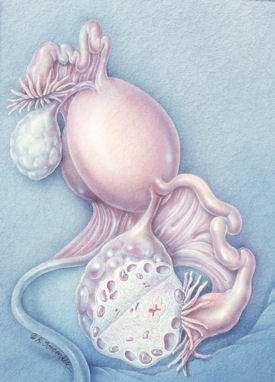Follow the changes to Medicare coding edits for early 2009
CMS will publish some previously unreleased medically unlikely edits, which had made it nearly impossible for physicians to know whether the billed number of services resulted in denied charges without a specific reason.
CMS is expanding the reach of the National Correct Coding Initiative (NCCI), effective Jan. 1. The NCCI edits, built into the Medicare contractors' claims processing systems, control improper payment of Part B claims by disallowing certain combinations of CPT codes to be billed together, or by limiting the payable number of units for some services.
The NCCI contains two types of edits: the Column 1/Column 2 edits, and the Medically Unlikely Edits (MUEs). Notable changes in the NCCI program in 2009 involve the breadth of the edits, and making more of the edit information available to the public.
Column 1/ Column 2
Column 1/Column 2 code edits get their name from the table in which they appear. The CPT codes appearing in Column 1 are the payable service. The codes in Column 2 are the non-payable codes. In effect, the edit bundles the Column 2 service into the Column 1 service when either:
- Column 2 is an integral part of Column 1, or when
- Column 1 and Column 2 could not reasonably based on medical necessity be provided to the same patient on the same day by the same physician.
To illustrate the first circumstance: one possible edit pair might be CPT codes 99304 Initial nursing facility care, per day, for the evaluation and management of a patient and 80500 Clinical pathology consultation; limited, without review of patient's history and medical records. If an NCCI edit goes into effect for this code pair, only the 99304 service will be paid if billed with 80500. The charge for CPT code 80550 will be denied.
Table and Table 2 are excerpts from a 2008 version of the Column 1/Column 2 edits.
- Column 1 is the payable code in the edit pair
- Column 2 is the non-payable code in the edit pair
- Column 3 shows whether an edit pair was established before 1996 (none of these examples were)
- Column 4 shows the first effective date of the edit
- Column 5 shows the deletion date of the edit. In this example, only the code pair 99304/78730 was deleted from the edit package on Jan. 1, 2006.
- Column 6 shows whether exceptions are allowed for billing the code pair.
An example of the second circumstance (medical necessity edits) are the edits prohibiting payment of initial nursing facility services on the same day as subsequent nursing facility services:
Medically Unlikely Edits
An MUE for a CPT code sets the maximum number of units that a physician would report under most circumstances for a single beneficiary on a single date of service. The MUE is based on the natural anatomic limits (such as two eyes, 10 fingers, or two ears), the HCPCS and CPT code descriptors, CPT coding instructions, CMS policies, the nature of service/procedure (e.g., a 24-hour laboratory test), the nature of equipment, and the physician's clinical judgment. Accordingly, if the MUE is “2,” the physician cannot be paid for more than 2 units of that code for a single patient on a single date of service. It must be noted that not all HCPCS/CPT codes have MUEs associated with them.
For example, the descriptor for CPT code 99306 is “Initial nursing facility care, per day, for the evaluation and management of a patient.” For this particular CPT code, the MUE is one unit; the physician is limited to billing this service once per patient per day because an initial service will not happen more than one time per patient. Another example might be a “per day” immunization, such as 90465 Immunization administration younger than 8 years of age (includes percutaneous, intradermal, subcutaneous, or intramuscular injections) when the physician counsels the patient/family; first injection (single or combination vaccine/toxoid), per day. This code is limited, by its descriptor, to one unit billable per day.
Changes for 2009
The first major change is that the Column1/Column 2 edits will be expanded to Part B institutional providers' claims. Some institutional settings (skilled nursing facilities, comprehensive outpatient rehab facilities, and home health agencies) had not previously been subject to NCCI edits. Hospital outpatient claims are already subject to the edits, but beginning in January, physician claims for services provided in SNFs, CORFs, and HHAs will also be subject to the NCCI edits.
The expansion of NCCI into SNFs, CORFs, and HHAs also entails the inclusion of evaluation and management codes into the edit package. Edits on evaluation and management services were previously excluded from enforcement under the NCCI program. Putting them into play will be a significant change for internal medicine coding, because the code edits will prohibit some coding combinations that were previously allowable. This could result in loss of revenues for some practices. These institutional Column 1/Column 2 edits became available Jan. 1 on the CMS Web site.
The second change is that CMS will publish some MUEs. CMS developed MUEs to reduce the number of overpaid claims in Part B. This set of edits had not previously been released to the public, making it nearly impossible for physicians to know whether the billed number of services bumped against an MUE, resulting in denied charges without a specific reason. CMS, responding to recommendations from ACP and others, now makes most of the MUEs available on its Web site. MUEs established through subsequent versions of the program will be added to the Web site. The agency decided against making publically available MUEs that the agency suspects could potentially trigger fraudulent and abusive coding.
CPT or HCPCS codes that represent services denied based on NCCI edits cannot be billed to Medicare beneficiaries, because the denials are based on incorrect coding, not on medical necessity. As such, the physician cannot use an “Advanced Beneficiary Notice” (ABN) form to seek payment from the beneficiary. Nor can the physician use a “Notice of Exclusions from Medicare Benefits” (NEMB) to collect the denied charge, because the NCCI is unrelated to a legislated Medicare benefit exclusion.
ACP is one of many medical specialty societies who periodically provide input and recommendations to CMS on its proposed edits. We will continue to advocate for the interests of internal medicine, and to inform and educate our members of changes to the coding edit programs, as new developments occur.




